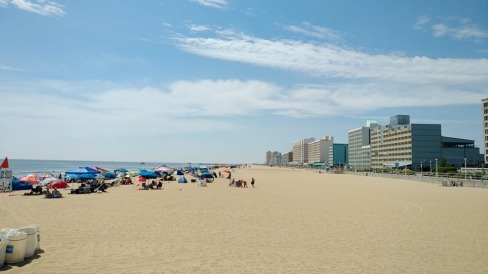
One couple pulled and pushed a cooler, presumably filled with ice and drinks and some food, across the sand to their blanket on the beach while their kids ran on ahead, tossing their plastic pails near their umbrella and then kicked into the surf about knee high.
The lifeguard stood and whistled for someone to come closer to shore, but I couldn’t see who he was calling from where I sat on the deck of the restaurant. We took a table under the overhang to stay out of the direct sun in the nearly 100 degree heat.
From 14th Street clear to the inlet at First, this same scene played out; umbrellas and beach chairs, blankets and radios, kids in the surf, surfers further out, jet skis and parasailers beyond them. A plane passed with a banner pushing the food at Rockefellers.
Since I’m a kid, this has been my summers: the sounds of the surf, of gulls, of tourists, and of music drifting down from the boardwalk; vendors, bikers, hawkers selling key chains, teenage girls selling ice cream, and guys sweet-talking middle-aged couples into touring some time-sharing place at Fifth Street. Get a free gift they say; no obligation they say.
This has never been a vacation for me; I’ve never traveled to find a hotel at the beach, anymore than some of my New York cousins would think about taking four or five days off from work to head to the city. It is daily life, it is normal routine. Most of my friends from high school, and the vast majority of non-tourist-shop business people I know in the area, prefer winter, celebrate the departure of the crowds, the “See You in April” signs on hotel marquees, and plywood on the windows at Dairy Queen. But I’m okay with it. This is a window back and forward, my youth and my foreseeable future, and the beautiful blending of sounds, the cold drinks, the hot sun on my shoulders, the two guys tossing a football or throwing a Frisbee, the sun-worshipers stretched out in just the right direction and angle to get an even tan, the older woman reading one of the Bronte sisters, the guy listening to the baseball game, all of it remains some sort of soundtrack of my summers, and I feel at peace with it all, including for what I don’t hear.
There’s an absence of politics, an absence of any sense of argument other than the couple who forgot the towels in their hotel room and one of them has to go back—but that one plays out all summer long every summer.
This is as much America to me as the farmer in the field or the family barbecue on the Fourth of July.
I have never been able to sit on the beach and absorb the sun, however. I prefer to walk, and when I’m at the right beach, I look for shells, and when with friends I toss a Frisbee or just walk along the beach ankle deep in the water and talk. So many of my memories are along this coast.
Like the time my friend Jonmark finished a concert for some dance at the Old Cavalier Hotel, he and I walked for awhile and talked until well into the small hours. We were teenagers, both about to move away. Or when one hot summer day my friend Kathy and I swam out beyond the pier on the Bay only to swim too far, and spent the next hour or so taking turns dragging each other back to the sand. Or when Michele looked away for a second, just one lousy second, and we could no longer see her little sister Carrie anywhere, and we called and yelled and walked both ways and waded out into the Atlantic, only to see her bobbing along with her red hair down from the boardwalk eating an ice cream cone.
Or earlier. Long Island. Point Lookout, and my siblings and I would carry our towels and walk down the middle of Freeport Avenue pushing our toes into the soft strip of tar which separated the two sides of the road, all the way to the beach where we’d walk around the red sand-fence and settle down for the day.
For now though, I come back here like an astronaut between space-walks. Usually I am alone, and I walk the length of the boardwalk and just think. Sometimes about something I’m working on, other times about people I miss, and there are many of them. Usually though, this becomes the one place I am not spending too much precious time remembering or planning, but simply being, letting the five senses take over and translate my life to me through the sounds and sights of the coast. And the saltwater sits on my lips, and the smell of the salty air mixes with somebody’s sun lotion, and I dig my toes into the sand to cool them off from the blistering surface. And it feels right. It feels like I’m doing fine; as if no matter what else is not going well in my life, I’ve got this right.
And I’ve learned to see a riptide or how bad the undertow is, and I’ve learned to read the sky for an afternoon storm, and I’ve learned to let it all just be.






